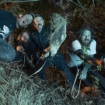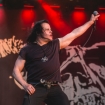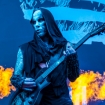The day after the San Bernardino, California Mayhem Fest show, Behemoth frontman Adam "Nergal" Darksi awakens in his bus bunk feeling like ice picks are gouging his brain. Dizzy and weak, he pries open his eyes, stumbles down the aisle and out of the vehicle and is practically blinded by the piercing Seattle sunlight.
With great effort, Darski staggers past the parked bus, down the parking lot and into the band's hotel. A cup of coffee and a full breakfast later, he's still hurting, but not as much, and is jovial enough to talk about last night's misadventures.
"Man, the bus was fuckin' raging," he explains in a strong Polish accent. "There were 100 people or something and it was moving and there was loud music and all kinds of joy. It was fuckin' Babylon on wheels."
Darski laughs in a sinister, yet inviting way, then continues. "I think we went a bit too wild, maybe. Crazy things happened. I'm not in a position to reveal any secrets, though. Just use your imagination."
For many, many blood-red moons, Darksi has indulged in the hedonistic perks of being a touring musician on a nightly basis. However, as he approaches his eighteenth year with Behemoth, the founder of Poland's most successful black/death metal band is actually toning down his extracurricular exploits and saving his maniacal energy for the stage—most of the time.
"Sometimes, like when you go to Los Angeles, you have to go fucking crazy, but mostly I'm not party animal any more," he insists. "I like to stay in shape. I work out a lot. I stretch and do push-ups and eat healthy. I'm a very disciplined guy these days."
If Darski is finally viewing his body as a temple, at least the altar is still adorned with goat's heads and inverted crosses. Evangelion, Behemoth's ninth full-length studio album is brutal and blasphemous, filled with savage riffs, thunderous rhythms and bellowing vocals to rattle the gates of Hell. It's also strikingly eclectic. "Ov Fire and the Void" is textural and doom-laden, countering double-bass drumming with crunching guitars, while "Transmigrating Beyond the Realms of Ament" is as fast as it is crushing, yet somehow integrates stabs of melody into the torrents of noise.
Darski started writing Evangelion at his home in Poland in the summer of 2008, and finished most of the songs by October. Then he, bassist Tomasz "Orion" Wróblewski and drummer Zbigniew Robert "Inferno" Promiński worked on the arrangements in their practice space from August to October before spending an additional three months tracking the songs with co-producer Daniel Bergstrand (Meshuggah, In Flames, Dark Funeral). Finally, Colin Richardson (Slipknot, Trivium) spent three weeks mixing the album.
During our interview with Darski, Behemoth's frontman spoke candidly about his new lifestyle, the negative forces he overcame to create Evangelion, his odd relationship with Polish pop singer Doda and the true meaning of Satanism.
Why did you decide to curb your party animal ways?
Back in the day, going on tour was like being on vacation. I'd drink, do drugs, eat badly, then recover when I was back home. These days I spend most of my life on the bus, not at home. So I really have to learn how to live my life well on tour. I don't want to ruin myself. I want to stay in good shape and feel well.
Are you more optimistic these days?
Definitely. When I wake up every morning I make it a point to look in the mirror and tell myself, "You have wonderful life." Even if I look like shit in the morning, have pieces of makeup in my face, have slept only a few hours because the bus was shaking, I still need to realize that this is the best life I could dream of.
How would you describe your state of mind now as compared to when you first released your last album, The Apostasy?
When I did The Apostasy, I was so fuckin' worn out, burnt out and pissed off. My private life was so dull and boring that I got really depressed. And I wasn't entirely happy with the record. It was good, but it could have been so much better. So, when Apostasy was out I wouldn't even listen to it because it would just stress me out.
What's different now?
Evangelion is the first record that I'm officially happy with. Of course, a creator of his own opus should never be entirely happy 100 percent, and I'm not. But I think it's the ultimate Behemoth record and I can sleep well, finally, which is good. It's going to take more than three years before we even try to start recording the next album because we're so fulfilled.
What do you like best about Evangelion.
It sounds like million dollars, but it's still very dangerous record—very ambitious and diverse. There's no single song that sounds like another and that makes the record very monolithic. That was one of my main goals with The Apostasy that I failed with. Apostasy was drifting in too many directions and it kind of lost its focus. And Evangelion being such a diverse album, it's a very focused record. The Apostasy was 39 minutes and it felt like 45. Evangelion is 42 and it feels like it's 35.
It's more eclectic, for sure, but on the whole it doesn't seem as fast. Did you decide to sacrifice some of the speed in favor of diversity?
We used to want to compete with every other band. We wanted to be the fastest and most technical and heaviest and everything else. With Evangelion it was like, you know what, we are who we are. It doesn't really matter if we play fast or mid-tempo or slow or heavy or technical or primitive. We're just gonna do what we feel like doing and go with the flow and make music that's honest and sincere.
You're quite a perfectionist. Was it agonizing to get the songs exactly the way you wanted them?
Surprisingly, no. It was a pretty joyful record to make. It was pretty smooth and we were having a good time in the studio. It was very energy consuming of course, and the hours were long. We had to stay focused, but this was the first time that I was making a record where, after three months in the studio, I wasn't burnt out, worn out and hating myself, the whole world, and my own band.
Despite your positivism, there's no lack of fire and fury in these songs.
Let's just say I dealt with some difficult things in my private life. I really don't want to wash the dirt in public, but I can say this album was made in periods when I was totally hyped and in love. And then it was also done during the most depressing and shitty moments of my life. The beginning of the year was so fucking bad, I was in pieces. But even in the worst moments, I would somehow find strength to carry on and channel all these energies into the music.
Is this album any less Satanic than your past work?
I think the Satanic aspect is always present because I find that element of life is so important and, actually, positive. It's part of our nature to oppose and not to conform. That's what I consider Satanic, standing for who we are. Although we not perfect like so-called God, we're gonna be ourselves, and we're gonna make ourselves equal to God by denying the divine being that can actually rule over us. We say, "OK, now we have to find a divine potential within ourselves in order to be equal to so-called God.
Does becoming equal to God mean achieving goals at the expense of others—the inverse of Christianity's "Do unto others" axiom?
It's up to you. Our philosophy is supposed to be pragmatic and helpful in life, not the opposite, but it's up to you how and if you use the tools. We're not slaves to anything or anybody. It's the tools that we make our slaves in order to make our lives better and easier. The highest virtue in my life is experience and I use that to describe things. But everyone has his own experience. With Behemoth, we're just trying to show that there are millions of alternatives out there and it's up to you what to choose. I'm not here to tell you what's black and what's white.
What's the meaning of the album title?
Evangelion is Greek for messenger of good news or the one who spreads the gospel. In a Biblical sense, it's basically spreading the word of God. I just thought using this term for a Behemoth record was blasphemous and very powerful because we are spreading our own gospel. We are also spreading good news, but our good news is pretty fucking opposite from what Christians call good news. We are spreading the gospel of the new eon. And the new eon stands for individuality—the autonomy and divine potential of every human being. It's all about free thinking and strong will.
What was the most revelatory moment you had while working on Evangelion?
Before we did "Lucifer," I got a book of poems by Tadeusz Micinski. I randomly opened it to one of the verses and it read something like, "And the hordes of Nergal, God of the underworld were following him." It was an overwhelming experience. Here's a writer that's been dead for 100 years now, and it felt like he was speaking to me. And that's how I came up with the idea of using this poem in "Lucifer."
You recently made tabloid headlines in Poland when you started dating 25-year-old Polish pop star Dorota Rabczewska (a.k.a Doda), who is a member of Polish Mensa and has an IQ of 156.
She's a cute lady and she's awesome and very smart and we get along real well, so there's nothing wrong about it. The fact that I'm dating a lady that's not a part of the extreme metal scene—c'mon man, we're not kids anymore. We're just attracted to each other, that's it. And it's my private life and my thing. No one has anything to do with it.
What do you two have in common?
She's very open-minded and she's curious about what I do. Obviously, she doesn't understand this music, and it works the other way, too. I respect what she does, but it's not really my aesthetics. And besides, she makes music and I make music, so we actually have more in common than other people who are together. A taxi driver can date a cook or a florist and people see no problem in that. C'mon, we're both musicians. It's just different genres. Different angles, that's it.
How did you meet?
She saw me on a TV show in Poland two years ago and she was curious. We got to know each other through a friend of mine, who's also working for her. Then we [exchanged] telephone numbers and started calling each other. She was over here in U.S. touring and I was in Poland. Then when she came back we had a date and it started rolling from there. It went pretty fast.
In 2007, the head of the Polish Committee for Defense against Sects, Ryszard Nowak, tried to have Behemoth banned after you ripped a bible onstage. What's the status of that?
He feels very threatened by Behemoth so he tried to bring me to the courts twice, but the case was deleted so I wasn't even convicted for blasphemy for the Bible incident. And then the guy kept calling me a criminal in the press, and I considered it slander, so I brought him to court and won the case in March. He had to pay $1,000, cover all the costs of the trial and actually apologize to me officially in the biggest Polish press.
Has that had a chilling effect on those who consider you a bad influence?
Well, I don't think people like him will stop what they do. I found out a few days ago that we have to cancel a festival show we were supposed to headline in Slovakia. Their government said no to Behemoth and we are now forbidden to enter the country. They consider us dangerous because we question laws. But if you ask me, I think Behemoth is very positive. If you make young people think for themselves and open their eyes you're doing a very important thing. I just hope this disease is not going to spread across Europe. I don't want to lose my job.












